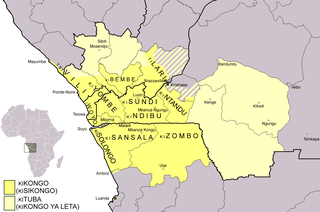
Back Kongo (taal) Afrikaans لغة كونغو Arabic Kikongo AST Konqo dili Azerbaijani کونقو دیلی AZB Конга (мова) Byelorussian কঙ্গো ভাষা Bengali/Bangla Kongoeg Breton Kongo, San Salvador Catalan Konžština Czech
| Kongo | |
|---|---|
| Kikongo | |
| Native to | DR Congo (Kongo Central), Angola, Republic of the Congo, Gabon |
| Ethnicity | Kongo |
Native speakers | (L1: 6.0 million cited 1982–2021)[1] L2: 5.0 million (2021)[1] |
| Latin, Mandombe | |
| Official status | |
Official language in | National language and unofficial language: |
| Language codes | |
| ISO 639-1 | kg |
| ISO 639-2 | kon |
| ISO 639-3 | kon – inclusive codeIndividual codes: kng – Koongoldi – Ladi, Laadi, Lari or Laarikwy – San Salvador Kongo (South)yom – Yombe |
| Glottolog | yomb1244 Yombe |
H.14–16[2] | |
 Map of the area where Kongo and Kituba are spoken, Kituba as a lingua franca. Kisikongo (also called Kisansala by some authors) is the Kikongo spoken in Mbanza Kongo. | |
| The Kongo language | |
|---|---|
| Person | muKongo, musi Kongo, muisi Kongo, mwisi Kongo, nKongo |
| People | baKongo, bisi Kongo, besi Kongo, esiKongo, aKongo |
| Language | kiKongo |
Kongo or Kikongo is one of the Bantu languages spoken by the Kongo people living in the Democratic Republic of the Congo (DRC), the Republic of the Congo, Gabon, and Angola. It is a tonal language. The vast majority of present-day speakers live in Africa. There are roughly seven million native speakers of Kongo in the above-named countries. An estimated five million more speakers use it as a second language.[1]
Historically, it was spoken by many of those Africans who for centuries were taken captive, transported across the Atlantic, and sold as slaves in the Americas. For this reason, creolized forms of the language are found in ritual speech of Afro-American religions, especially in Brazil, Cuba, Puerto Rico, Dominican Republic, Haiti, and Suriname. It is also one of the sources of the Gullah language, which formed in the Low Country and Sea Islands of the United States Southeast.[3] The Palenquero creole in Colombia is also related to Kong creole.
- ^ a b c Kongo at Ethnologue (27th ed., 2024)

Koongo at Ethnologue (27th ed., 2024)
Ladi, Laadi, Lari or Laari at Ethnologue (27th ed., 2024)
San Salvador Kongo (South) at Ethnologue (27th ed., 2024)
Yombe at Ethnologue (27th ed., 2024)
- ^ Jouni Filip Maho, 2009. New Updated Guthrie List Online
- ^ Adam Hochschild (1998). King Leopold's Ghost. Houghton Mifflin. p. 11. ISBN 9780618001903.